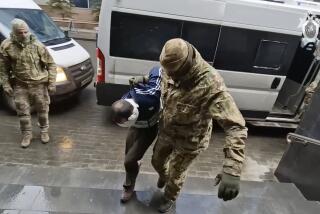Soviets and Terrorists
- Share via
Washington is skeptical of the Soviet Union’s professed interest in international cooperation against terrorists--and rightly so, considering the record. This does not mean, however, that the Soviet feelers to West European governments should be rejected out of hand. Bringing Moscow into the international dialogue on terrorism just might lead to eventual Soviet cooperation.
The Soviet Union does not appear to have approached Washington, but in December it began telling a number of West European governments that it was prepared to join forces in combating terrorism. A few days ago reports circulated that the Soviets were sending out feelers again, suggesting the negotiation of extradition treaties for the return of terrorist suspects.
Unfortunately, the Soviet government, even more than others, is selective in its definition of terrorism. The Soviets condemn free-lance terrorists or organized terrorism by pro-Western forces, but tend to make excuses for terrorists who maim and murder innocent people in the name of anti-Western struggles for “national liberation.”
Almost nobody has accused the Russians of having direct control over the scruffy terrorists who have seized airliners and killed innocent travelers in the last two decades. But client states of the Soviet Union, including Libya and Syria, have been deeply involved. And Soviet Bloc countries have provided them with safe haven and, according to reports, assistance in training potential terrorists.
The Soviets, possibly in response to evidence that they, too, are vulnerable to terrorism, have become sensitive lately to Western charges of support for international terrorists. In early 1986 Soviet leader Mikhail S. Gorbachev made a speech stating flatly that “the Soviet Union rejects terrorism in principle and is prepared to cooperate actively with other states to uproot it.”
The Soviets could, if they would, become invaluable allies in the global struggle against terrorists. Since the Soviets are still giving political and material support to some of the nations most involved in terrorism, however, there is a natural suspicion that Moscow is more interested in the appearance of opposing terrorism than in the reality of it.
This could be changing, especially if the reports of Soviet concern over the potential for terrorism in their own Muslim territories are true.
It would do no harm for Washington to heed the recommendation by the Atlantic Council--a private group of highly influential Americans, Canadians and Europeans--that the United States as well as the Europeans engage the Soviets in talks aimed at finding out just how serious Gorbachev’s offer of anti-terrorist cooperation may be.
More to Read
Sign up for Essential California
The most important California stories and recommendations in your inbox every morning.
You may occasionally receive promotional content from the Los Angeles Times.









